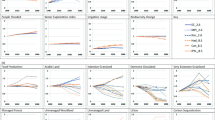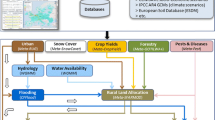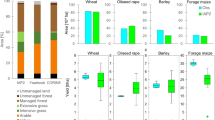Abstract
The PESETA project makes a high-resolution integrated assessment of the effects of climate change in Europe in the following impact categories: agriculture, river floods, coastal systems, tourism and human health. Many relevant methodological decisions underlie the multi-disciplinary assessment, such as the selection of the climate scenarios and the economic valuation of the physical impacts. The main purpose of this article is to document the methodological framework of the PESETA project, identifying also where further research is required. How the different sources of uncertainty have been addressed in the project is explicitly analysed, including the climate change scenarios and the various sectoral methodologies.









Similar content being viewed by others
Notes
In this article, it is argued that all the sectoral impact models are physical in the sense that they model variables expressed in physical units, versus in economic units. However, the tourism and human health models are based on statistical relationships, even if modelling physical variables (bed nights in the case of the tourism model and mortality in the case of the human health model).
The human health impact category does not appear in Fig. 1 because its results were not integrated into the CGE model.
The IPCC criteria are: consistency with global projections (scenarios should be consistent with a broad range of global warming projections based on increased concentrations of greenhouse gases); physical plausibility (scenarios should be physically plausible; that is, they should not violate the basic laws of physics); applicability in impact assessments (scenarios should describe changes in a sufficient number of variables on a spatial and temporal scale that allows for impact assessment); representative (scenarios should be representative of the potential range of future regional climate change); and, accessibility (scenarios should be straightforward to obtain, interpret and apply for impact assessment).
Economist call this approach ‘comparative statics’.
References
Amelung B, Moreno A (2011) Costing the impact of climate change on tourism in Europe: results from the PESETA project. Climatic Change
Beniston M, Stephenson DB, Christensen OB, Ferro CAT, Frei C, Goyette S, Halsnaes K, Holt T, Jylhä K, Koffi B, Palutikof JP, Schöll R, Semmler T, Woth K (2007) Future extreme events in European climate: an exploration of regional climate model projections. Clim Chang 81:71–95
Bosello F, Nicholls R, Richards J, Roson R, Tol RSJ (2011) Economic impacts of climate change in Europe: sea-level rise. Climatic Change
Carter TR (2007) Assessing the adaptive capacity of the Finnish environment and society under a changing climate: FINADAPT, Finnish Environment, 1/2007, 76
Carter TR, Jones RN, Lu X, Bhadwal S, Conde C, Mearns LO, O’Neill BC, Rounsevell MDA, Zurek MB (2007) New assessment methods and the characterisation of future conditions. In: Parry ML, Canziani OF, Palutikof JP, Van der Linden PJ, Hanson CE (eds) Climate change 2007: impacts, adaptation and vulnerability. Contribution of working group II to the fourth assessment report of the intergovernmental panel on climate change. Cambridge University Press, Cambridge, pp 133–171
Christensen JH, Christensen OB (2007) A summary of the PRUDENCE model projections of changes in European climate by the end of this century. Clim Chang 81:7–30
Christensen JH, Carter TR, Rummukainen M (2007) Evaluating the performance and utility of regional climate models: the PRUDENCE project. Clim Chang 81:1–6
Ciscar JC, Szabó L, Van Regemorter D, Soria A (2011) The integration of PESETA sectoral economic impacts into GEM-E3 Europe: methodology and results. Climatic Change
Darwin RF, Tol RSJ (2001) Estimates of the economic effects of sea level rise. Environ Resour Econ 19:113–129
Déqué M, Rowell DP, Lüthi D, Giorgi F, Christensen JH, Rockel B, Jacob D, Kjellström E, de Castro M, Van den Hurk B (2007) An intercomparison of regional climate simulations for Europe: assessing uncertainties in model projections. Clim Chang 81:53–70
Dessai S, Hulme M (2004) Does climate adaptation policy need probabilities? Clim Pol 4:107–128
European Commission (2009) White paper “adapting to climate change: towards a European framework for action”, COM(2009) 147 final
Feyen L, Dankers R, Bódis, K, Salamon P, Barredo JI (2011) Climate warming and future flood risk in Europe. Climatic Change
Fronzek S, Carter TR (2007) Assessing uncertainties in climate change impacts on resource potential for Europe based on projections from RCMs and GCMs. Clim Chang 81:357–371
Hayhoe K, Cayan D, Field CB, Peter FC, Maurer EP, Miller NL, Moser SC, Schneider SH, Cahill KN, Cleland EE, Dale L, Drapek R, Hanemann RM, Kalkstein LS, Lenihan J, Lunch CK, Neilson RP, Sheridan SC, Verville JH (2004) Emissions pathways, climate change, and impacts on California. Proc Natl Acad Sci 101:12422–12427
Hinkel J, Klein RJT (2006) Integrating knowledge for assessing coastal vulnerability to climate change. In: McFadden L, Penning-Rowsell EC (eds) Managing coastal vulnerability: an integrated approach. Elsevier Science
Hitz S, Smith J (2004) Estimating global impacts from climate change. Glob Environ Chang 14:201–218
Iglesias A, Garrote L, Quiroga, M, Moneo M (2011) A regional comparison of the effects of climate change on agriculture in Europe. Climatic Change
IPCC (2001) In: Houghton JT, Ding Y, Griggs DJ, Noguer M, Van der Linden PJ, Dai X, Maskell K, Johnson CA (eds) Climate change 2001: the scientific basis–contribution of working group I to the third assessment report of the intergovernmental panel on climate change. Cambridge University Press, Cambridge, United Kingdom and New York, NY, USA
IPCC (2007) In: Solomon S, Qin D, Manning M, Marquis M, Averyt K, Tignor MMB, Miller HL Jr, Chen Z (eds) Climate change 2007: the physical science basis–contribution of working group I to the fourth assessment report of the intergovernmental panel on climate change. Cambridge University Press, Cambridge, United Kingdom and New York, NY, USA
Jacob D, 18 others (2007) An inter-comparison of regional climate models for Europe: model performance in present-day climate. Climatic Change 81: 31–52
Jorgenson DW, Goettle RJ, Hurd BH, Smith JS (2004) U.S. market consequences of climate change, Pew Center on Global Climate Change
Kjellström E, Giorgi F (2010) Introduction to special issue. Clim Res 44:117–119. doi:10.3354/cr00976
Kjellström E, Bärring L, Gollvik S, Hansson U, Jones C, Samuelsson P, Rummukainen M, Ullerstig A, Willén U, Wyser K (2005) A 140-year simulation of European climate with the new version of the Rossby Centre regional atmospheric climate model (RCA3). SMHI report No. 108. Available as http://www.smhi.se/publikationer/a-140-year-simulation-of-european-climate-with-the-new-version-of-77the-rossby-centre-regional-atmospheric-climate-model-rca3-1.2107
Kjellström E, Bärring L, Jacob D, Jones R, Lenderink G, Schär C (2007) Modelling daily temperature extremes: recent climate and future changes over Europe. Clim Chang 81:249–265
Levina E, Tirpak D (2006) Adaptation to climate change: key terms. (CON/ENV/EPOC/IEA/SLT(2006)1), OECD
Mearns LO, Giorgi F, Whetton P, Pabon D, Hulme M, Lal M (2003) Guidelines for use of climate scenarios developed from regional climate model experiments, Intergovernmental Panel on Climate Change (IPCC). Task Group on Data and Scenario Support for Impacts and Climate Analysis (TGICA). Available from: http://www.ipcc-data.org/guidelines/dgm_no1_v1_10-2003.pdf
Mendelsohn R, Neumann JE (1999) The impact of climate change on the United States economy, Cambridge Univ. Press
Menne B, Ebi KL (eds) (2006) Climate change and adaptation strategies for human health. WHO (Europe)
Nakicenovic N, 27 others (2000) Emissions scenarios, a special report of working group III of the intergovernmental panel on climate change. Cambridge, United Kingdom: Cambridge University Press
Nordhaus W (2007) Critical assumptions in the stern review on climate change. Science 317:201–202
Ruth M, Donaghy K, Kishen P (2006) Regional climate change and variability. Impacts and Responses, Edward Elgar
Schmidli J, Goodess CM, Frei C, Haylock MR, Hundecha Y, Ribalaygua J, Schmith T (2007) Statistical and dynamical downscaling of precipitation: an evaluation and comparison of scenarios for the European Alps. J Geophys Res 112:D04105. doi:10.1029/2005JD007026
Schröter D, et al. (2005) Ecosystem service supply and vulnerability to global change in Europe. Science 310 25 November 2005
Shoven JB, Whalley YJ (1992) Applying general equilibrium, Cambridge University Press
Stern N, Taylor C (2007) Climate change: risk, ethics, and the Stern review. Science 317:203–204
TGICA (2007) General guidelines on the use of scenario data for climate impact and adaptation assessment. Version 2, June 2007, Task Group on Data and Scenario Support for Impact and Climate Assessment, available at http://www.ipcc-data.org/guidelines/TGICA_guidance_sdciaa_v2_final.pdf
Tol RSJ (2005) The DIVA model: socio-economic scenarios, impacts and adaptation, and world heritage, available at http://diva.demis.nl/files/folders/downloads/entry25.aspx
Van der Linden P, Mitchell JFB (eds) (2009) ENSEMBLES: climate change and its impacts: summary of research and results from the ENSEMBLES project. Met Office Hadley Centre, Fitzroy Road, Exeter EX1 3PB, UK. p 160
Van Regemorter D (2005) GEM-E3. Computable General equilibrium model for studying economy-energy-environment interactions for Europe and the world, available at http://www.gem-e3.net/download/GEMmodel.pdf
Van Vuuren D, O'Neill BC (2006) The consistency of IPCC’s SRES scenarios to 1990–2000 trends and recent projections. Clim Chang 75(1–2):9–46
Watkiss P, Hunt A (2011) Projection of economic impacts of climate change in sectors of europe based on bottom up analysis: human health. Climatic Change
Wilby RL, Charles SP, Zorita E, Timbal B, Whetton P, Mearns LO (2004) Guidelines for use of climate scenarios developed from statistical downscaling methods, Intergovernmental Panel on Climate Change (IPCC). Task Group on Data and Scenario Support for Impacts and Climate Analysis (TGICA), available at http://ipcc-ddc.cru.uea.ac.uk/guidelines/StatDown_Guide.pdf
Acknowledgements
The authors would like to thank the two anonymous referees and the members of the PESETA Advisory Board (in particular, Tim Carter) for their many useful remarks and comments. The PESETA project was entirely financed by the Joint Research Centre, which is acknowledged.
Author information
Authors and Affiliations
Corresponding author
Additional information
The views expressed are purely those of Juan-Carlos Ciscar and may not in any circumstances be regarded as stating an official position of the European Commission.
Rights and permissions
About this article
Cite this article
Christensen, O.B., Goodess, C.M. & Ciscar, JC. Methodological framework of the PESETA project on the impacts of climate change in Europe. Climatic Change 112, 7–28 (2012). https://doi.org/10.1007/s10584-011-0337-9
Received:
Accepted:
Published:
Issue Date:
DOI: https://doi.org/10.1007/s10584-011-0337-9




